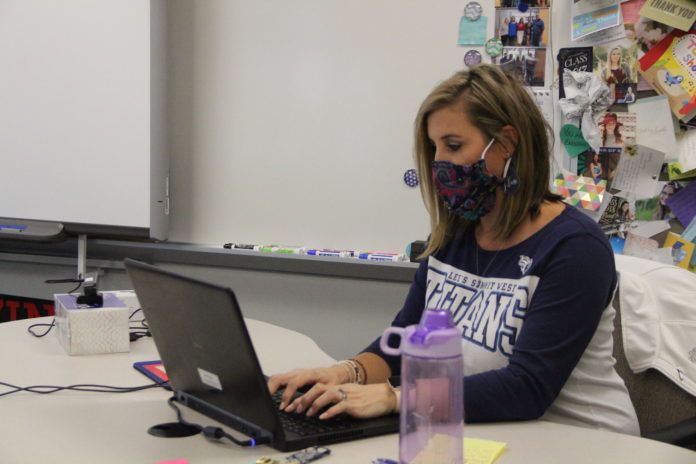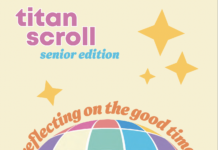Last week saw another first in LSR7 school district history with the pivot from a virtual to hybrid learning model with less than a week’s notice, which forced teachers to rethink their lessons.
English teacher Mary Beth Rich said she saw the change coming but wasn’t anticipating it coming so quickly. “I kind of prepared myself that we would be in person at some point. I think a lot of us knew that it was coming, but I also think that it felt really quick to end on a Tuesday and start on a Monday,” Rich said.
The decision from Superintendent Dr. David Buck to move grades 4-12 students into the classrooms twice a week, came on the heels of his meeting with health department officials on Sept. 29. The decision was communicated to students and parents that same day.
“Well I wasn’t surprised, I thought it was probably coming up the pike,” said debate teacher Matt Good. “It seems like a couple weeks ago was when you really started to feel the momentum shift to where it looked like we were going to be going back.”
Business teacher Meredith Hayes said the transition from online to hybrid learning was a bit rocky. She said her initial reaction was ‘Oh crap’ just because I knew how much work would be involved in preparing for hybrid.”
That work in the hybrid format requires teachers to prepare lessons and present to students in the classrooms four days out of the week, while also preparing for students to be learning at home, on their own, three days out of the week.
“The initial reaction was just kind of mild panic because there was so much that we still had to do to set up our room. Moving to hybrid meant that we had to kind of focus in and change our whole teaching practices,” choir teacher Jacob Lowry said. “The reality of having students in the room– especially singing students who we are supposed to have 6 feet apart–that just kind of put us into a mode where we had to suddenly problem solve.”
That was the sort of reality for teachers across the district as they moved to welcome students back into their classrooms. “We do it because we love what we’re doing, we love the music that we get to make. We love the relationships that we get to build. It’s what keeps us coming every single day,” Lowery said.
“I think [the first couple weeks of hybrid instruction] will be a learning curve for all of us because in essence it’s sort of like the first day of school all over again” Rich said. “Now we have to establish a classroom culture when we were just in the middle of establishing an online culture.”
Classroom culture, however, is going to look a bit different this year than it has in years past. Rich said “I think it will take time for kids to truly feel comfortable especially when things are different … you can’t just congregate in a room. You have to stay in your seat.”
Those concerns for students were voiced by teachers as they worked last week to prepare for the change. Hayes said she worries for her students who have become accustomed to the online routine and also for those who need more in-person support that can be provided in two days. “In this environment you are teaching yourself and some kids can’t do that. They’re not independent learners yet … I think high school is where you’re still learning how to learn,”Hayes said.
The routines and learning methods that have become a routine part of school are going to look different because of the safety requirements. With social distancing guidelines, it’s going to be a lot harder for students to collaborate. “You can’t necessarily put your desks together and work collaboratively, it’s going to have to be from a distance,” Rich said.
Biology teacher Kelli Trask said she is concerned about the necessity of maintaining the new guidelines and precautions in the classrooms. “I’m not worried about masks, it’s the cleaning of the tables and that sort of thing that we really haven’t had to do in our homes that we’re going to ask everyone to help with now and that worries me,” Trask said. “If you come into a classroom you’re expected to clean your own desk.”
Trask said the additional responsibility is concerning. “It’s just one more thing that I’m going to be held accountable for … It’s one more thing on my plate that I’ve got to be like ok, did everyone clean off their table…it just worries me that I’ll miss it and someone’s going to end up with it.”
Hayes said in the beginning she wasn’t particularly fearful of COVID-19, but now is a lot more aware of taking preventive measures. “Now that I’m going to have up to 21 kids in my classroom (because of how the alphabet split) touching all the same stuff, breathing all the same air … I think of it more now. I make sure that I’m wearing my mask at all times and that I’m not touching things,” she said. “I’m a huge hugger … to not be able to do that is going to be hard for me.”
While adapting to the new environment and adjusting their teaching styles, teachers said they are also looking for different ways to relieve some stress. Chemistry teacher Mark Lutman’s approach is to keep a light-hearted attitude for the students.
During virtual instruction Lutman played music in the background of his Google Meets to get his students hyped for chemistry. “I call it the batter up song [the one from] Major League Baseball … I start every class now with like, some song that I think kids are gonna like, you know, different genres. I just have it playing in the background as the kids are coming on to the Google Meet.”
Adapting is becoming a necessity for all aspects of school and Good said is preparing for a very different year in debate. He said he foresees most debate tournaments will be virtual.
For some kids he said, that might not be a bad thing. “I think that there are a few kids that might even be preferable because some of the anxiety that comes from speaking and debating in front of others is alleviated when you’re just talking into your computer camera,” Good said.
But clearly, that experience is not the norm.
For most, Hayes said, in person learning is best and she is glad to have kids back in the classroom. “Not all students are meant to be online students. I had a student, one of my freshmen, who said ‘I just wish they would erase all of our grades until now because it’s so hard. Virtual learning sucks,’ is what he said. I feel like there are way more people who feel that way.”














